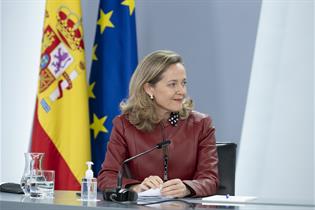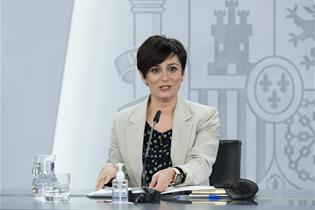Extraordinary Council of Ministers
The Government of Spain approves the Startups Law to encourage innovative entrepreneurship
Council of Ministers - 2021.12.10
Moncloa Palace, Madrid
The Council of Ministers has approved referring the Bill to promote the start-up ecosystem, better known as the Start-up Law, to Parliament.
The First Vice-President of the Government of Spain and Minister for Economic Affairs and Digital Transformation, Nadia Calviño, stated that, with this regulation to promote innovative entrepreneurship, Spain will be among the most attractive countries for the creation of start-ups, "thinking especially about generating opportunities for young people and attracting investment and talent".
Calviño pointed out that the law was necessary to provide a specific regulatory framework for these types of companies, which form the basis of the new digital economy, generate highly skilled jobs and have great potential to grow if they can overcome inherent difficulties such as lack of financing and the ability to attract and retain high value-added workers in their initial stages.
The vice-president has framed the new law within the set of measures, reforms and investments that the Government is promoting through the Recovery, Transformation and Resilience Plan to change the productive structure in our country, improve the business climate and create jobs. She recalled the recent referral to Parliament of the Crea y Crece Bill and announced that the draft law on bankruptcy reform would soon be approved. She also referred to projects such as the Next-Tech Fund, with up to four billion euros to scale and increase the size of disruptive technology start-ups, and the aid programme to support and finance women-led entrepreneurship in its early stages.
"We are working hard to meet the milestones of the Plan to drive a strong, sustainable, sustained and fair recovery," he said.
Requirements for the creation of a Startup
 Foto: Pool Moncloa/Borja Puig de la BellacasaThe draft law establishes that companies will be considered startups if they are innovative, newly created or have been in existence for up to five years in general, or seven years in the case of biotechnology, energy and industrial companies; if they have their registered office, permanent establishment and the majority of employment in Spain; if they have not distributed dividends and are not listed, and if they have a turnover of up to five million euros.
Foto: Pool Moncloa/Borja Puig de la BellacasaThe draft law establishes that companies will be considered startups if they are innovative, newly created or have been in existence for up to five years in general, or seven years in the case of biotechnology, energy and industrial companies; if they have their registered office, permanent establishment and the majority of employment in Spain; if they have not distributed dividends and are not listed, and if they have a turnover of up to five million euros.
The vice-president underlined that the procedures for their creation are facilitated by the elimination of notary and registry fees in the case of companies created under the standard statutes and electronically. It will also be possible to incorporate a company by means of a single electronic document and to register it in the commercial register within six hours if standard articles of association are used, and within five working days in all other cases. The requirement to obtain a foreigner's identification number for non-resident investors is also eliminated and, for the first three years, the start-up is exempted from the cause of dissolution for losses related to or generating an equity imbalance.
Empresa Nacional de Innovación SA (ENISA), under the Ministry of Industry, Trade and Tourism will be responsible for the accreditation of companies as startups so that they can access the benefits established by law, and there will be Entrepreneur Service Points and a National Office of Entrepreneurship that will function as portals or windows for information and access to public aid.
Incentives for entrepreneurs and workers
The new rule provides for a very favourable tax regime, both for companies and their investors as well as for their employees.
For the former, among other measures, the tax rate for corporate and non-resident income tax is reduced, tax debt can be deferred without guarantees or interest for late payment, the obligation to make instalment payments is eliminated and the maximum deduction base for investment in new or recently created companies is raised from 60,000 to 100,000 euros per year.
Employees, Calviño continued, will see improved treatment of forms of remuneration based on stock options. It also eliminates the double Social Security contribution for three years for those entrepreneurs who simultaneously hold a job as an employee.
In addition, in order to attract so-called digital nomads (entrepreneurs and teleworkers who move to Spain), a more streamlined procedure is established for them to obtain a visa and residency, as well as a special tax regime. Spaniards who have been non-residents in Spain for at least five years are included in this measure.
New mobility model
 Foto: Pool Moncloa/Borja Puig de la BellacasaThe Executive has given the green light to the Safe, Sustainable and Connected Mobility Strategy 2030. The Minister for Transport, Urban Agenda and Mobility (Mitma), Raquel Sánchez, stressed its innovative nature, which is based on a new concept of mobility as a basic right of all citizens and an instrument of social and territorial cohesion.
Foto: Pool Moncloa/Borja Puig de la BellacasaThe Executive has given the green light to the Safe, Sustainable and Connected Mobility Strategy 2030. The Minister for Transport, Urban Agenda and Mobility (Mitma), Raquel Sánchez, stressed its innovative nature, which is based on a new concept of mobility as a basic right of all citizens and an instrument of social and territorial cohesion.
This premise reorients the role and meaning of the ministry itself, Sánchez explained: "MITMA has traditionally been known for providing the necessary infrastructure and major works, and this will continue to be the case, but now we need to go a step further and focus on also optimising the use of existing infrastructure and providing effective mobility solutions for citizens. Therefore, citizens have to be at the centre of all our actions.
Precisely with this objective in mind, the document is the result of a process initiated in September 2020 in which all actors of the mobility ecosystem and society as a whole have participated.
The minister also stressed that the sector, which now represents 4.27% of GDP, is essential for job creation in our country, with more than 900,000 jobs associated with it, so the investment from the Recovery, Transformation and Resilience Plan will be decisive: "If we meet our projections, we will make it possible for the electrification of the economy and connectivity to account for 15% of GDP by 2030".
Safety, sustainability and connectivity
The Strategy is structured in 9 axes and 41 lines of action and contains more than 150 measures that pursue the three main objectives that give it its name: safety, sustainability and connectivity.
Infrastructure maintenance, especially on roads to reduce road fatalities, is complemented by other measures to ensure operational safety, in emergencies or against unlawful acts.
To advance environmental sustainability, decarbonisation, energy efficiency and the circular economy, the promotion of public transport and the use of more sustainable modes of transport, such as rail, for both people and goods, are encouraged: "We are at the back of Europe in this sense, and we are setting ourselves objectives that will allow us to increase the percentage of freight transport by rail compared to the current situation", stressed Sánchez.
Social sustainability must mean, the minister continued, that mobility must be "universal, inclusive and accessible to all" and at the same time "with guarantees of decent work for transport and logistics professionals". The document also takes into account that 80% of the population is concentrated in large cities and the remaining 20% is spread over more than two thirds of the territory, representing two very different realities of mobility that need to be addressed.
Economic sustainability will be based on boosting all sectors associated with the new decarbonised and connected mobility. For the automotive sector, which accounts for 11% of total industry turnover in Spain, the Recovery Plan foresees, for example, the PERTE of electric and connected vehicles.
Key components for connectivity are digitalisation and the application of new technologies for intelligent transport management and automation.
European connection
The minister highlighted the need to strengthen Spain's role in the trans-European transport network in order to position itself as an intercontinental logistics platform. To this end, the Atlantic and Mediterranean corridors and their connections with the major ports, intermodal logistics nodes, industrial areas and airports must be completed.
Blue or marine energy development
 Foto: Pool Moncloa/Borja Puig de la BellacasaThe Government has approved the Roadmap for the Development of offshore wind and marine energy in Spain.
Foto: Pool Moncloa/Borja Puig de la BellacasaThe Government has approved the Roadmap for the Development of offshore wind and marine energy in Spain.
The Minister for Territorial Policy and Government Spokesperson, Isabel Rodríguez, has stated that this strategy will enable technological development and research into the different clean sources that make use of natural marine resources, or "blue energy", to be boosted.
For this, 200 million euros will come from the Recovery, Transformation and Resilience Plan, to which funds from other European and state funding programmes will be added.
Rodríguez pointed out that Spain is already a leader in offshore wind turbine solutions on a floating platform: "Seven of the thirteen existing patents are Spanish, so I think this is a good reason to feel proud as a country.
Improving accessibility in housing
The Council of Ministers has granted 50 million euros in direct subsidies to the regional governments to strengthen care for dependent adults, promote the change in the support and long-term care model and improve accessibility from a comprehensive perspective.
The pandemic has placed 100,000 elderly, disabled and dependent people in an extremely serious position, living in communities of owners without accessibility measures or in housing that is not adapted to their needs.
Isabel Rodríguez explained that at least 50% of these subsidies will be used to improve accessibility in housing, through aid to individuals and communities of owners, and in publicly-owned housing parks. The other 50% will be devoted to actions inside homes, especially in rural areas where elderly, disabled or dependent people live, through grants to individuals.
Modernisation of social services
The Executive has agreed to grant subsidies to third sector entities, amounting to 49.5 million euros, to carry out pilot innovation and research projects aimed at modernising and improving social services. The measure, part of the Recovery Plan, aims to strengthen and transform social services so that they respond to today's challenges and cater especially for the most vulnerable people in crisis situations.
The government spokesperson explained that the actions financed are grouped around three axes: care for children, with projects focused on minors at risk, under guardianship or out of care by the Administration; care for the homeless; and care for the elderly with long-term care needs.
Combating forced labour
The Council of Ministers has ratified the National Action Plan against Forced Labour. This is the first time, stressed Isabel Rodríguez, that Spain has adopted a specific plan to combat forced labour in a joint and coordinated manner with all the relevant departments and bodies, and with the participation of the social partners and specialised organisations.
The goal is to eradicate forced labour inside and outside Spain and to comply with international commitments, such as the 2014 Protocol of the International Labour Organization (ILO), ratified by Spain in December 2017 and whose requirement to develop a national action plan had not been complied with until now.
To improve coordination and involve all parties, the plan intensifies detection, investigation and prosecution and increases the activity in this area of the Labour Inspectorate, the State Security Forces and Corps and the State Prosecutor's Office. It also strengthens protection and support for the victims of this scourge.
Non official translation





